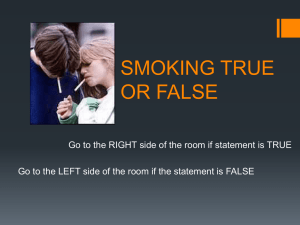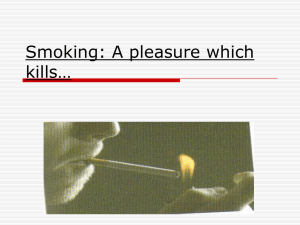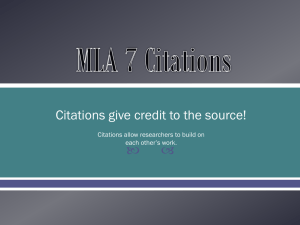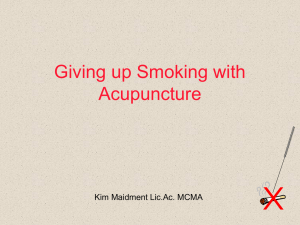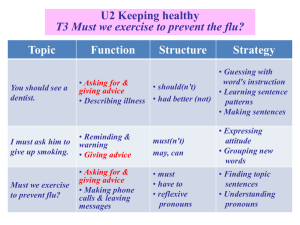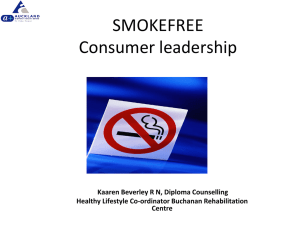Very brief advice on smoking
advertisement
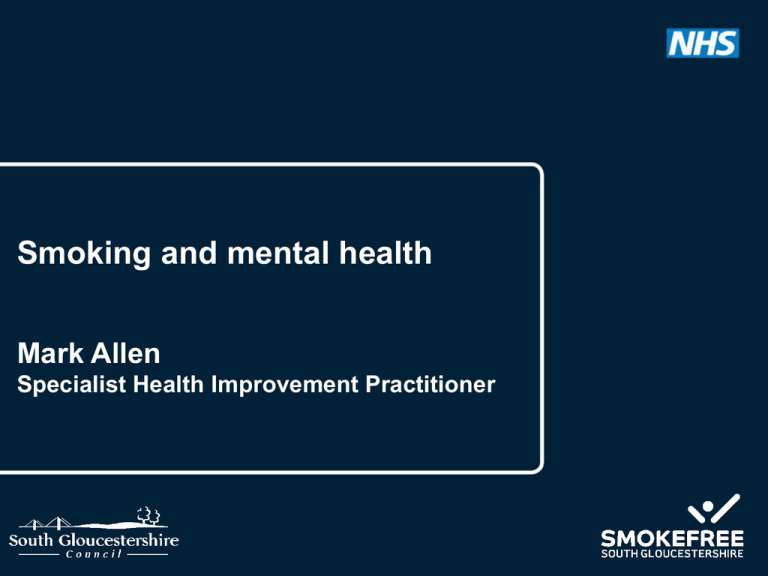
Smoking and mental health Mark Allen Specialist Health Improvement Practitioner Contents • Health effects of smoking • Tobacco addiction • Links between mental health and smoking • Smoking cessation • Very brief advice and referral • 10 million adults smoke cigarettes in Great Britain = 19.5% prevalence • Half of all regular cigarette smokers will eventually be killed by their addiction (ASH 2013, Factsheet) • Every year, over 100,000 smokers in the UK die from smoking related causes (ibid.) • Main cause of preventable morbidity and premature death in England (NICE, 2008 Guidelines PH10) Health benefits of stopping smoking 1. US Department of Health and Human Services (2006) Tobacco addiction Physical Psychological Social Physical Nicotine dependence Psychological Habit/Cues and Triggers Beliefs about benefits Low mood, stress, anxiety Social/cultural Friends, family, colleagues, neighbours Smoking and mental health Rationale for addressing smoking and mental health • Smoking is responsible for the largest proportion of the excess mortality of people with a mental disorder (DoH, 2011) • Motivation to stop is high – 50% of smokers with MH problems say that they want to stop (Phelan et al, 2013) Smoking prevalence • General population = 21% • Common mental disorder = 32% • Psychosis = 40% • Alcohol dependence = 46% • Illicit drug dependence = 69% • Inpatient schizophrenia = 70% McManus et al, 2010 , Kumari & Postma, 2005 and Jochelson and Majrowski, 2006 Bi-directional link • Evidence that long-term smoking is associated with the onset and worsening of depression and anxiety (Pasco 2008; Johnson 2000) Why higher smoking prevalence in MH? • Genetics? • Deprivation • Self-medication of MH symptoms – belief that smoking helps with stress, anxiety and low mood • Smoking actually increases symptoms Effect of stopping smoking on mental health • In the short term, nicotine withdrawal can include low mood and anxiety, however, • “Smoking cessation is associated with reduced depression, anxiety, and stress and improved positive mood and quality of life compared with continuing to smoke. The effect size seems as large for those with psychiatric disorders as those without. The effect sizes are equal or larger than those of antidepressant treatment for mood and anxiety disorders.” (Taylor et al. BMJ, 2014) • Doses of some medicines can be reduced, especially Clozapine Reduction of rehospitalisation risk Smoking cessation treatment may decrease rehospitalisation risk: “The findings support initiation of motivationally tailored tobacco cessation treatment during acute psychiatric hospitalization. Psychiatric severity did not moderate treatment efficacy, and cessation treatment appeared to decrease rehospitalization risk, perhaps by providing broader therapeutic benefit.” (Prochaska et al., 2013) Smoking cessation Smokers want and expect to be asked about their smoking (Conroy et al.2005) Smokers are up to 4 x more likely to stop with support and treatment from a stop smoking service (DH 2011) Stop smoking services • 1:1 or group support; weekly appointments • In GP practices, pharmacies, community settings • Combination of medication and behavioural support • Nicotine replacement therapy (NRT) – patches, gum, etc. • Champix or Zyban – prescription medications which act on the part of the brain involved in nicotine addiction Stop smoking medicines Electronic cigarettes • Electronic cigarettes deliver nicotine by heating and vapourising a solution of nicotine, propylene glycol and/or glycerol, plus flavours • 2.1 million UK adult users in 2014 • Generally considered significantly less harmful than smoking; no tobacco, no combustion • Used as an aid to quitting or cutting down; nearly 2/3rds electronic cigarette users are smokers and 1/3rd are ex-smokers • Health professionals can give advice that they are likely to be significantly less harmful than smoking, and stop smoking services should be open to electronic cigarette use in people keen to try them NCSCT (2014) Electronic cigarettes Very brief advice on smoking ASK (and record) “Do you smoke?” ADVISE “Did you know the best way to stop is with support and medication? With these you are up to four times more times likely to stop.” ACT “Would you like me to refer you to Smokefree South Gloucestershire? They can book you an appointment with a Stop Smoking Practitioner for free support and medication.” Referral Royal Colleges of Physicians and Psychiatrists 2013 Report - Only a minority of people with mental disorders receive effective smoking cessation interventions - Smokefree policy is crucial to promoting smoking cessation in mental health settings - Smokers with mental disorders using primary and secondary care services, at all levels, should be identified and provided routinely and immediately with specialist smoking cessation behavioural support, and pharmacotherapy to relieve nicotine withdrawal, promote cessation and reduce harm - All mental health professionals should be trained in awareness of smoking as an issue, to deliver brief cessation advice, and to provide or arrange further support for those who want help to quit Partnership possibilities - Review Smokefree Policy for staff and service-users - Support available for staff to stop smoking - Routinely ask and record smoking status - Refer to Smokefree South Gloucestershire - Provide in-house support; medications (NRT, Champix, Zyban) and support (free training available from Smokefree South Gloucestershire) (- Harm reduction approaches?) - Champions, peer support Smokefree South Gloucestershire 01454 865502 smokefree@southglos.gov.uk

